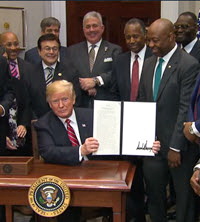President Trump on Dec. 12 signed an Executive Order that seeks to facilitate long-term equity investment in new Opportunity Zones and other low-income communities. The order formally established the White House Opportunity and Revitalization Council. (White House statement and PBS Video, Dec. 12)
 |
|
President Trump on Dec. 12 signed an Executive Order that seeks to facilitate long-term equity investment in new Opportunity Zones and other low-income communities. (White House statement and PBS Video) |
- Congress created Opportunity Zones in the 2017 Tax Cuts and Jobs Act to encourage long-term, capital investment in economically struggling, low-income communities. Opportunity Funds that invest in tangible business property, such as real estate, located in a qualifying zone are eligible for tax benefits that are tied to the investment holding period. The capital gain on an Opportunity Fund investment is excluded from tax altogether if the asset is held for 10 years or more.
- In June 2018, the Treasury Department designated 8,761 communities in all 50 States, the District of Columbia, and five Territories as Opportunity Zones. (IRS Notice 2018-48 and Roundtable Weekly, June 22)
- The new Council will lead joint efforts across executive departments and agencies to implement reforms that streamline existing regulations, optimize the use of federal resources, and align the requirements for public and private investment programs in economically distressed communities. The Council will also present the President with a number of reports identifying and recommending ways to encourage investment in these areas. (White House statement, Dec. 12). The White House signing was live streamed and included comments from Sen. Tim Scott (R-SC), the original author and sponsor of Opportunity Zone legislation. (New York Times, Jan. 29, 2018)
- The Council-chaired by Secretary of Housing and Urban Development Ben Carson-will be comprised of officials from 13 Federal agencies and include Treasury Secretary Steven Mnuchin and Commerce Secretary Wilbur Ross.
Second Round of Opportunity Zone Regulations Expected in January
- The Treasury Department released its first round of Proposed Regulations governing the Opportunity Zone program in October. An Oct. 26 GlobeSt.com interview with Real Estate Roundtable President & CEO Jeffrey DeBoer and Roundtable SVP and Counsel Ryan McCormick focused on the initial regulatory guidance and its implications for the real estate industry.

The next round of Opportunity Zone regulations may be released in January, according to Treasury Assistant Secretary for Tax Policy David Kautter, above. (Tax Notes, Dec. 14).
- The next round of Opportunity Zone regulations may be released in January, according to Treasury Assistant Secretary for Tax Policy David Kautter. (Tax Notes, Dec. 14)
- The day after the White House Executive Order signing, Kautter told reporters that it would be “about January before we come out with additional guidance.” Kauter noted, “The first set of regulations was designed to provide rules for getting funds up and operating, and the second set of rules is more about the operational aspects of the funds themselves.”
- According to the New York Times, an anonymous administration official said Tuesday that the coming regulations would include reporting requirements for investments in Opportunity Zones to evaluate the program‘s impact. (New York Times, Dec. 12)
The Roundtable’s Tax Policy Advisory Committee (TPAC) recently convened a panel on Opportunity Zones that included the tax counsel for Senator Tim Scott (R-SC). TPAC’s Opportunity Zone Working Group is developing additional comments on how the industry can help the program fulfill its ambitious objective of stimulating economic development and job creation in low-income communities. (Roundtable Comment Letter, June 28 and Roundtable Weekly, July 20)


